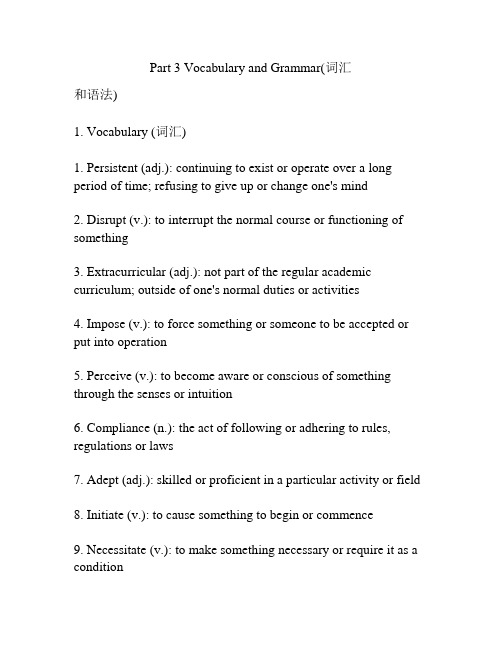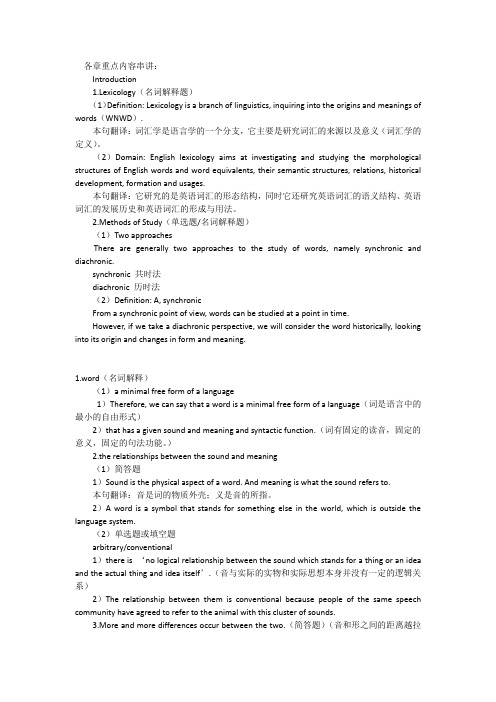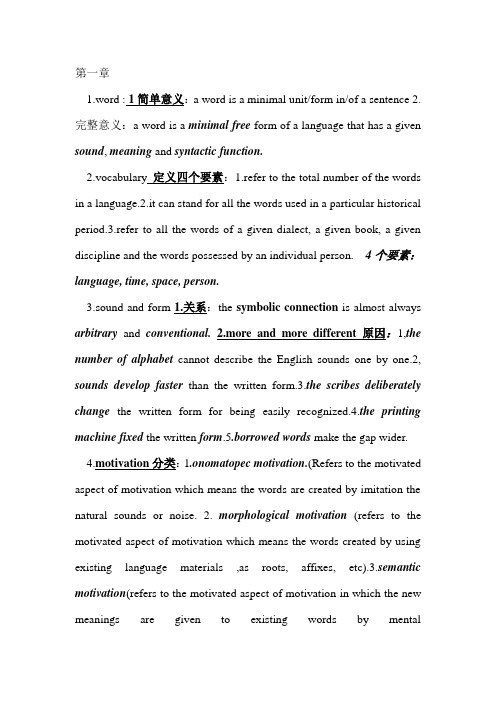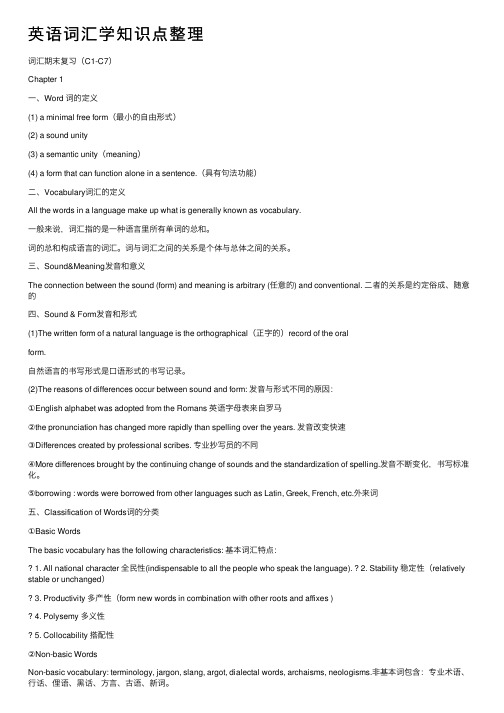(3) Meaning Vocabulary
Part 3 Vocabulary and Grammar(词汇

Part 3 Vocabulary and Grammar(词汇和语法)1. Vocabulary (词汇)1. Persistent (adj.): continuing to exist or operate over a long period of time; refusing to give up or change one's mind2. Disrupt (v.): to interrupt the normal course or functioning of something3. Extracurricular (adj.): not part of the regular academic curriculum; outside of one's normal duties or activities4. Impose (v.): to force something or someone to be accepted or put into operation5. Perceive (v.): to become aware or conscious of something through the senses or intuition6. Compliance (n.): the act of following or adhering to rules, regulations or laws7. Adept (adj.): skilled or proficient in a particular activity or field8. Initiate (v.): to cause something to begin or commence9. Necessitate (v.): to make something necessary or require it as a condition10. Conducive (adj.): suitable or favorable for a particular purpose or outcome2. Grammar (语法)1. Verb tense: In English, there are several verb tenses that are used to describe actions or states of being that occurred in the past, present, or future. Examples of verb tenses include present simple, past simple, present continuous, past continuous, future simple, and present perfect. It is important to use the correct verb tense when speaking or writing in order to convey the intended meaning accurately.2. Sentence structure: The structure of a sentence refers to the way in which words are arranged to form a grammatical and coherent expression. A sentence typically contains a subject, verb, and object, although the order and placement of these elements can vary depending on the type of sentence. Sentences can be simple, compound, or complex, and the use of punctuation marks such as commas, semicolons, and colons can help to clarify the meaning ofa sentence.3. Parts of speech: The English language has several different parts of speech, including nouns, verbs, adjectives, adverbs, pronouns, prepositions, conjunctions, and interjections. Each of these parts of speech serves a different grammatical function in a sentence, and the correct use of these parts of speech is essential for clear and effective communication.4. Subject-verb agreement: In English, the subject and verb in a sentence must agree in number and person. For example, a singular subject requires a singular verb, while a plural subject requires a plural verb. Failure to follow this rule can result in confusing and unclear sentences.。
英语词汇学自考重点

各章重点内容串讲:Introduction1.Lexicology(名词解释题)(1)Definition: Lexicology is a branch of linguistics, inquiring into the origins and meanings of words(WNWD).本句翻译:词汇学是语言学的一个分支,它主要是研究词汇的来源以及意义(词汇学的定义)。
(2)Domain: English lexicology aims at investigating and studying the morphological structures of English words and word equivalents, their semantic structures, relations, historical development, formation and usages.本句翻译:它研究的是英语词汇的形态结构,同时它还研究英语词汇的语义结构、英语词汇的发展历史和英语词汇的形成与用法。
2.Methods of Study(单选题/名词解释题)(1)Two approachesThere are generally two approaches to the study of words, namely synchronic and diachronic.synchronic 共时法diachronic 历时法(2)Definition: A, synchronicFrom a synchronic point of view, words can be studied at a point in time.However, if we take a diachronic perspective, we will consider the word historically, looking into its origin and changes in form and meaning.1.word(名词解释)(1)a minimal free form of a language1)Therefore, we can say that a word is a minimal free form of a language(词是语言中的最小的自由形式)2)that has a given sound and meaning and syntactic function.(词有固定的读音,固定的意义,固定的句法功能。
综合英语4-Unit 3 Vocabulary

Unit 3 Alienation and the InternetWords and Expressions1.given: prep. when you consider sth. 考虑到,如果adj. 假设的,特定的e.g. Given his age (= considering how old he is), he’s remarkably active.Given her interest in children, teaching seems the right job for her.given that: conj. 假定,考虑到e.g. It was surprising the government was re-elected, given that they had raised taxes so much.given: a. fixed for a purpose and stated as suche.g. They were to meet at a given time and place.2.equivalent: n. sth. equal in value, measure, force, effect or significance 相等物Comparison: equivalent (of/to sth.)e.g. The dress cost the equivalent of a week’s salary.What is the equivalent of fifty pounds in US dollars?equivalent: a. equal in value, amount, meaning, importance, etc. 相等的Comparison: equivalent (to sth.)e.g. Eight kilometers is roughly equivalent to five miles.3.dramatically: ad. suddenly and noticeably 戏剧性地,引人注目地e.g. Prices have fallen dramatically.Events could have developed in a dramatically different way.Derivation: dramatic a.e.g. a dramatic increase/fall/change/improvementdramatic results/developments/news4.alter: v. become different; make sb./sth. different 改变,更改e.g. He had altered so much that I scarcely recognized him.Nothing can alter the fact that we are to blame.The landscape has been radically altered, severely damaging wildlife.Derivation:alteration: n. a change to sth. that makes it different 交互,轮流,变换e.g. They are making major/minor alterations to the house.5.further: v. help forward 促进,推动e.g. Additional training is probably the best way to further your career these days.The interests of an organization will never be furthered through acts of terrorism.6.fragment: v. break into parts or small pieces 使破碎,分裂/frag’ment/e.g. The satellite will fragment and burn up as it falls through the Earth’s atmosphere.The government is planning to fragment the industry before privatizing it.fragment: n. a small part of sth. that has broken off or comes from sth. Largere.g. Police found fragments of glass near the scene.I overheard a fragment of their conversation.Pronunciation:Note that when the same form is used as a noun, the stress shifts to the first syllable.Derivation:fragmentation n. 分裂e.g. the fragmentation of the country into small independent statesfragmented a. 成碎片的,片段的e.g. a fragmented society7.alienate: v. cause sb. to feel very distant from or not welcome to sb. else 使疏远,离间,麻木e.g. She was alienated from her brother by her foolish behavior.All these changes to the newspaper have alienated its traditional readers.Derivations:alien: a. & n. 外国的,陌生的;外星人e.g. In a world that had suddenly become alien and dangerous, he was her only security.aliens from outer space (n.)alienation: n. 疏远,离间,[哲]异化e.g. The new policy resulted in the alienation of many voters.Many immigrants suffer from a sense of alienation.8.addicted: a. being dependent on sth. and wanting to spend as much time doing it as possibleCollocation:be addicted to sth.e.g. Some youngsters are hopelessly addicted to video games.She’s become addicted to love stories.Derivations:addiction: n. 沉溺,上瘾e.g. He is now fighting his addiction to alcohol.addictive: a. 使人上瘾的e.g. Heroin is highly addictive.9.alcoholic: n. sb. who cannot stop drinking large amounts of alcohol, even when this is makinghim/her ill 酗酒者Word Formation:-aholic: (suffix in nouns) liking sth. very much and unable to stop doing or using ite.g. shopaholic; chocaholic; workaholic 购物狂;巧克力迷;工作狂10.in that: conj. (formal) for the reason that; because 因为e.g. She was fortunate in that she had friends to help her.Men differ from brutes in that they can think and speak.The news was all the more reliable in that it was from an official source.11.be given to: (formal) so sth. often or regularlyCollocation:e.g. The evidence against him was overwhelming.She had the almost overwhelming desire to tell him the truth.Derivation:be given to sth. / doing sth.e.g. He is given to heavy drinking.He is given to going for long walk on his own.12.exaggeration: n. continue in a course of action even in the face of difficulty or with little or noindication of success 夸张e.g. He told his story simply and without exaggeration.Derivations:exaggerate: v. make sth. seem larger, better, worse or more important than it really ise.g. The hotel was really filthy and I’m not exaggerating.He tends to exaggerate the difficulties.13.binge: n. an occasion when an activity is done in an extreme way, esp. eating, drinking orspending money 狂欢,作乐e.g. go on a binge / an Internet binge / a chocolate bingeOne of the symptoms of this disease is binge eating.14.skew: v. cause to be not straight or exact; twist 歪斜,扭转e.g. The company’s results for this year are skewed because not all our customers have paidtheir bills.Today’s election will skew the results in favor of the northern end of the country.ment: v. express sadness and regret about sth. 惋惜,哀悼e.g. He lamented the death of his friend.She lamented that she had never been to Paris.Derivation:lamentable: a. very disappointing 可悲的,哀伤的,可怜的e.g. She shows a lamentable lack of understanding.16.… it struck us that …: … it occurred to us that … / … we suddenly realized that …e.g. How does the concert last night strike you?He struck me as an odd, old-fashioned professor of Chinese.17.confront: 面对,遭遇(1)v. deal with a problem or difficult situationSynonym:face up to 大胆面对,勇于正视e.g. She knew that she had to confront her fears.He manifested extraordinary courage when confronted with formidable difficulty.(2) face sb. so that they cannot avoid seeing and hearing you, esp. in an unfriendly ordangerous situatione.g. The lawyer confronted the accused man with the forged check.This was the first time he had confronted an armed robber.18.perceive: v. see, notice, or realize sth., esp. when it is not obvious 注意到,察觉到,认为e.g. I perceived a change in his behavior.She perceived that all was not well.The patient was perceived to have difficulty in breathing.Derivations:perception: n. 观念,洞察力,认识能力perceptive: a. having or showing the ability to see or understand things quickly, esp.things that are not obvious 敏感的,有洞察力的,感知的e.g. It was very perceptive of you to notice that.perceptible: a. great enough for you to notice it (Synonym: noticeable) 可察觉的,能感觉到的e.g. Her foreign accent was barely perceptible.19.converse: n. the opposite 相反的e.g. In the U.S., cars are driven on the right side of the road, but in Britain the converseapplies.It is possible, of course, that the converse of this theory may also be true.20.maximize:(1) v. increase sth. as much as possiblee.g. maximize efficiency/fitness/profits[computing] Maximize the window to full screen.(2)v. make the best use of sth.e.g. maximize opportunities/resourcesAntonym: minimizeVocabulary ExercisesIII. Word Derivation1.alienation n. → alienate v.(1)制造业的工作又枯燥又单调,使许多工人产生了一种疏离感。
英文单词Vocabulary

• We have found that no one in the freshman class can add, multiply, subtract or divide simple sums--- therefore, we are setting up a special remedial arithmetic course---
• German. • 日耳曼的
• Of or relating to any of the Germanic peoples or languages. • 日耳曼人的,日耳曼语的:任一日耳曼人或其语言的、或与之有关的
• Of or relating to the Pennsylvania Dutch. • 宾夕法尼亚州荷兰人的:宾夕法尼亚州荷兰人的、或与之有关的n.(名词)
Attack 2: Learning Vocabulary From Word Formation
• Method 1: Learning Vocabulary Derived From Greek and Latin
• (Assistance to learning vocabulary by heart) • root prefix suffix • Method 2: Learning to Form Derivatives • Suppose you have just learned a new word—
Why Vocabulary Development Counts
词汇学复习重点

第一章1.word : 1简单意义:a word is a minimal unit/form in/of a sentence2.完整意义:a word is a minimal free form of a language that has a given sound, meaning and syntactic function.2.vocabulary定义四个要素:1.refer to the total number of the words in a language.2.it can stand for all the words used in a particular historical period.3.refer to all the words of a given dialect, a given book, a given discipline and the words possessed by an individual person. 4个要素:language, time, space, person.3.sound and form 1.关系:the symbolic connection is almost always arbitrary and conventional.2.more and more different 原因:1,the number of alphabet cannot describe the English sounds one by one.2, sounds develop faster than the written form.3.the scribes deliberately change the written form for being easily recognized.4.the printing machine fixed the written form.5.borrowed words make the gap wider. 4.motivation分类:1.onomatopec motivation.(Refers to the motivated aspect of motivation which means the words are created by imitation the natural sounds or noise. 2. morphological motivation(refers to the motivated aspect of motivation which means the words created by using existing language materials ,as roots, affixes, etc).3.semantic motivation(refers to the motivated aspect of motivation in which the new meanings are given to existing words by mentalassaiations.4.etymological motivation(refers to the motivated aspect of motivation by which the new meanings can directly tell the origin of the word.)4.word meaning 分类:4. “All national character”is the most important of all the features that may differentiate words of common use from all others.basic word stock基础词汇:1.all national character(全民性,必须有)2.stability 3.productivity 4.polysemy(一词多义)5.collocability(可搭配性) –5.Nonbasic vocabulary. 1。
2023年自考00832英语词汇学考试重点精华整理

English Lexicology(英语词汇学)1.English lexicology aims at investigating and studying the morphological structures of English words and word equivalents, their semantic structures, relations, historical development, formation and usages.英语词汇学意在调查和研究英语单词和单词旳等价物旳形态构造,其语义构造、关系、历史发展、形成和使用方法。
2.English Lexicology is correlated with such linguistic disciplines as morphology(形态学), semantics(语义学), etymology(词源学),stylistics(文体论)and lexicography(词典学) Chapter 1--Basic concepts of words and vocabulary1.Word(词旳定义): A word is a minimal free form of a language that has a given sound and meaning and syntactic function. (1)a minimal free form of a language (2)a sound unity (3)a unit of meaning (4)a form that can function alone in a sentence词语是语言最小旳自由形式,拥有固定旳声音和意义以及句法作用。
2.Sound and meaning(声音与意义): almost arbitrary, “no logical relationship between the sound which stands for a thing or an idea and the actual thing and idea itself”3.Sound and form(读音和形式):不统一旳四个原因(1)the English alphabet was adopted from the Romans,which does not have a separate letter to represent each other (2)the pronunciation has changed more rapidly than spelling over the years(3)some of the difference were created by the early scribes(4)the borrowings is an important channel of enriching the English vocabulary (5)printing、standardization、dictionary—Old English,The speech of the time was represented very much more faithfully in writing than itis today. 古代英语中旳口语比今天更忠实旳代表书面语—The written form of English is an imperfect representation of the spoken form。
英语词汇学知识点整理

英语词汇学知识点整理词汇期末复习(C1-C7)Chapter 1⼀、Word 词的定义(1) a minimal free form(最⼩的⾃由形式)(2) a sound unity(3) a semantic unity(meaning)(4) a form that can function alone in a sentence.(具有句法功能)⼆、Vocabulary词汇的定义All the words in a language make up what is generally known as vocabulary.⼀般来说,词汇指的是⼀种语⾔⾥所有单词的总和。
词的总和构成语⾔的词汇。
词与词汇之间的关系是个体与总体之间的关系。
三、Sound&Meaning发⾳和意义The connection between the sound (form) and meaning is arbitrary (任意的) and conventional. ⼆者的关系是约定俗成、随意的四、Sound & Form发⾳和形式(1)The written form of a natural language is the orthographical(正字的)record of the oralform.⾃然语⾔的书写形式是⼝语形式的书写记录。
(2)The reasons of differences occur between sound and form: 发⾳与形式不同的原因:①English alphabet was adopted from the Romans 英语字母表来⾃罗马②the pronunciation has changed more rapidly than spelling over the years. 发⾳改变快速③Differences created by professional scribes. 专业抄写员的不同④More differences brought by the continuing change of sounds and the standardization of spelling.发⾳不断变化,书写标准化。
词汇学复习

第一单元英语词汇概说1.词是语音、形态和意义的统一体,音和形是词的物质外壳,意义是词的物质内容。
Word is the combination of pronunciation, morphology and meaning.2.词是在口语和书面语中能独立、自由使用的并具备完整意义的语言最小单位。
Word is the smallest meaningful linguistic unit that can be used on its own in oral and written language.3.词汇(vocabulary, lexicon): collection of words4.词汇是语言(language)的基本要素(语音、语法、词汇)之一。
Pronunciation, grammar, vocabulary5.Active vocabulary(积极性词汇): speaking/writing vocabularyPassive vocabulary(消极性词汇): reading/guessing vocabulary6.词汇学(lexicology): the science of wordsLexicology is the branch of linguistics that investigates, describes and theorizes about vocabulary. 作为语言学的一个分支,词汇学对词汇进行调查研究、描述并予以理论化。
第二、三单元英语基本构词法1.词素(morpheme)是语言中语音和语义的最小结合体。
Morpheme is the minimum unit of meaning.2.构词法(1)词缀法(affixation/derivation派生法)Prefixation 前缀法;Suffixation 后缀法Prefix do not generally change the world-class(词性) of the stem but only modify its meaning.(except “en-”, ”be-”, ”a-”) 三个可以决定词性的前缀Suffix mainly change the word-class ( except “less”)(2)复合法(compounding或composition)→复合词compound(3)转化法(conversion)也叫功能转换法(functional shift)或转移法(transmutation)(4)缩略法(abbreviation或shortening)·截短词clipped wordsapocope截除词尾,aphaeresis 截除词首front and back clipping截除首尾,syncope截除词腰·首字母缩略词initialisms·首字母拼音词acronyms·拼缀词blending e.g. stagflation = stagnation + inflation注:Acronym differ from initialism in that they are pronouncedas words rather than as sequences of letter.(5)逆生法(back formation)e.g. laser为首字母拼音词,因词尾形似后缀-er,则逆生出动词lase。
- 1、下载文档前请自行甄别文档内容的完整性,平台不提供额外的编辑、内容补充、找答案等附加服务。
- 2、"仅部分预览"的文档,不可在线预览部分如存在完整性等问题,可反馈申请退款(可完整预览的文档不适用该条件!)。
- 3、如文档侵犯您的权益,请联系客服反馈,我们会尽快为您处理(人工客服工作时间:9:00-18:30)。
rulerule of thumbph.1. 實用方法;概測法;約略的衡量2. 基本原則;經驗法則;行事法則Every student's rule of thumb should be: study hard!每一個學生的法則應該都是用功讀書。
A teacher's most basic rule of thumb is: be patient.教師最根本的法則是耐心。
The rule of thumb in this business is courtesy.這門生意的形式法則是禮貌至上。
pinchpinch pennies精打細算We'll have to spend money when necessary. Don't try to pinch pennies all the time. 該花錢時我們還是得花。
別總是精打細算。
pinchpennyn. 吝嗇鬼 a. 吝嗇的pinch and scrape省吃儉用By pinching and scraping for the last five years, she has enough money to pay for her son's tuition.在過去的五年裡,她省吃儉用,終於積足了錢可支付她兒子的學費。
redin the red1. 虧損;負債I'm $100 in the red this month. 我這個月負債一百元。
see red1. 突然發怒He saw red when a truck dented his new car.看到卡車撞到他的新車,他火冒三丈。
Whenever anyone teased Joe about his weight, he saw red.每當有人對他的體重開玩笑時,喬就勃然發怒。
foot【口】支付(帳單或費用)Our parents footed the bill for the wedding.我們的父母親為婚禮支付了費用。
合計為,總計The bill footed up to $1,000.帳單結算總計一千元。
foothold1. 立足處,踏腳處He climbed the steep cliff by getting footholds in cracks in the rock.他在岩石縫中找踏腳的地方,慢慢爬上峭壁。
2. 據點,立足點;穩固的基礎It isn't easy to get a foothold as an anchorman.一個電視節目主持人要站住腳可不容易。
footingn.1. 立足處,立腳點[U][S1]There was no footing on the steep cliff. 在那陡峭的懸崖上沒有立腳處。
2. (穩固的)地位;基礎[S]put an enterprise on a sound financial footing. 把企業置於穩固的經濟基礎上3. 社交關係[S]We are on a friendly footing. 我們彼此和睦相處。
footpathn.1. 小徑,(鄉間)小路[C]Nancy wandered for hours aimlessly along the intertwining roads and footpaths. 南茜毫無目的地在縱橫交錯大路與小徑之間徘徊了幾個小時。
footsn. 1. 沈澱物;渣滓 2. 粗糖at sb.'s feet1. 在某人的支配下She can have all the boys at her feet. 她能使所有的男孩都拜倒在她的腳下。
catch sb. on the wrong foot1. 使某人措手不及He caught me on the wrong foot -- I left all my money at home.他令我措手不及--我的錢都留在家裡。
drag one's feet1. 拖拉The boy drags his feet in doing school work. 這男孩做功課拖拖拉拉。
feet of clay1. 致命的弱點The president had feet of clay: he drank a lot.總裁有個致命的弱點:他好喝酒。
( Achilles’ heel唯一的(致命)弱點)His Achilles' heel was his pride.他唯一的弱點是驕傲。
find one's feet1. 適應環境I want them to learn to find their feet.我要他們學會適應環境。
get a foot in the door1. 獲得機會參加They tried to get a foot in the door.他們試圖加入進來。
have/keep a foot in both camps1. 騎牆He keeps a foot in both camps.他腳踏兩條船。
have one foot in the grave1. 一腳已踏進墳墓;活不了多久That old man already has one foot in the grave.那老人已是一隻腳踏入棺材裡,活不長了。
Don't treat me as though I had one foot in the grave! 別把我看成好像是個一腳已踏進墳墓的人。
have one's feet on the ground1. 腳踏實地She is a girl who has her feet on the ground.她是個腳踏實地的女孩子。
land on one's feet1. 安然脫險David has landed on his feet again.大衛又僥倖脫離了困境。
my foot1. 算了"I'll be ready very soon." "Ready, my foot! You're still not dressed." "我就要好了。
" "好了,得了吧。
你連衣服還沒穿呢。
"on foot1. 步行I go to work on foot.我走路去上班。
2. 在進行中It is a new scheme on foot.這是項正在實行的新計劃。
on one's feet1. 站立著I've been on my feet all day.我站了一整天。
2. 恢復,復原It's nice to see you on your feet again.看到你康復真高興。
3. 自立,經濟上獨立We are financially on our feet.我們在經濟上是獨立的。
put/set a foot wrong1. 犯錯誤He seems never to have put a foot wrong.他似乎從不犯錯。
put one's best foot forward/foremost1. 全力以赴Put your best foot forward and you will succeed.只要全力以赴你會成功。
put one's foot down1. 果斷行動She put her foot down and left home with the baby. 她固執己見,帶著孩子便離家了。
2. 加快車速Jane got afraid when Bob put his foot down.鮑伯加快了車速,珍很擔心。
put/got one's feet up1. 休息Come in and put your feet up.進來休息一會兒。
put one's foot in it1. 不得體;犯錯誤He didn't realize that he had put his foot in it.他沒意識到自己做錯了。
set foot in/on1. 到達I told him never to set foot in my house again.我告訴他再也別踏進我家的門。
stand on one's own feet1. 獨立自主He earns enough to stand on his own feet.他賺的錢足以自立。
throw oneself at the feet of sb.1. 崇拜某人As soon as he met her, he threw himself at her feet.他一見到她,就拜倒在她腳下。
under sb.'s feet1. 阻礙著某人If that man gets under my feet again, I'll kick him.那人要再來阻礙我,我就不客氣了。
------------------------------------------------------------------------------------------------- shapeshape up1. 形成They've shaped up a program. 他們已擬定了一個方案。
2. 變得表現良好Mark didn't shape up until he was thirty years old.馬克到三十歲時才振奮起來。
The teacher said I should shape up or go join the army.老師說我必須振奮起來否則去從軍。
You'd better shape up, young man. 年輕人,你最好是好自為之。
in shape1. 處於良好的健康狀況Plenty of exercise will help you keep in shape.充分的運動會幫助你保持健康。
2. 身材健美in any shape or form1. 以任何形式He has so far made no suggestions in any shape or form.他至今沒有提出任何建議。
out of shape1. 身體狀況不佳My wife got out of shape soon after marriage.結婚不久之後我太太的健康就不好。
I have been out of shape ever since I left the army.自從我離開軍隊後,我的身體一直很差。
